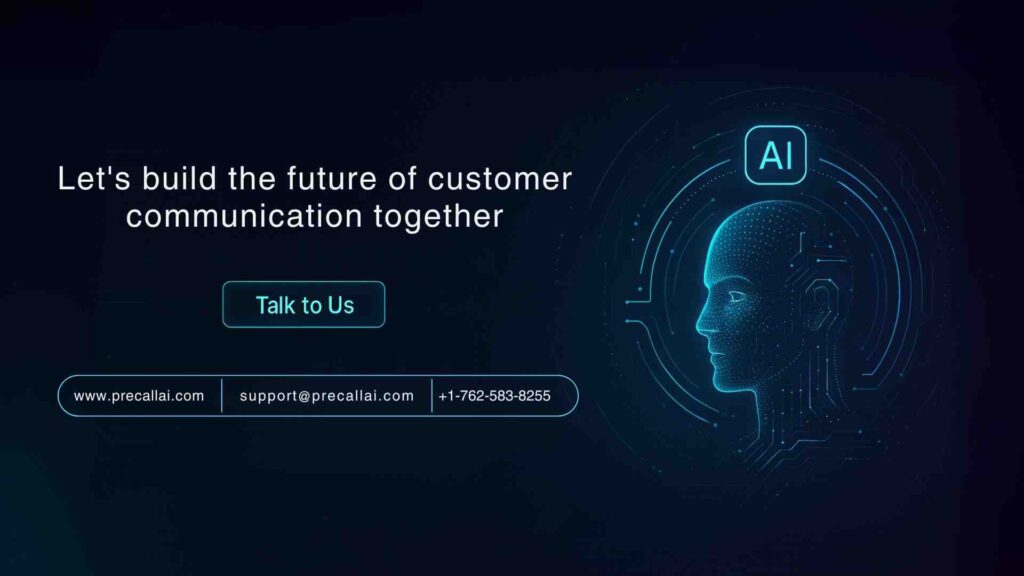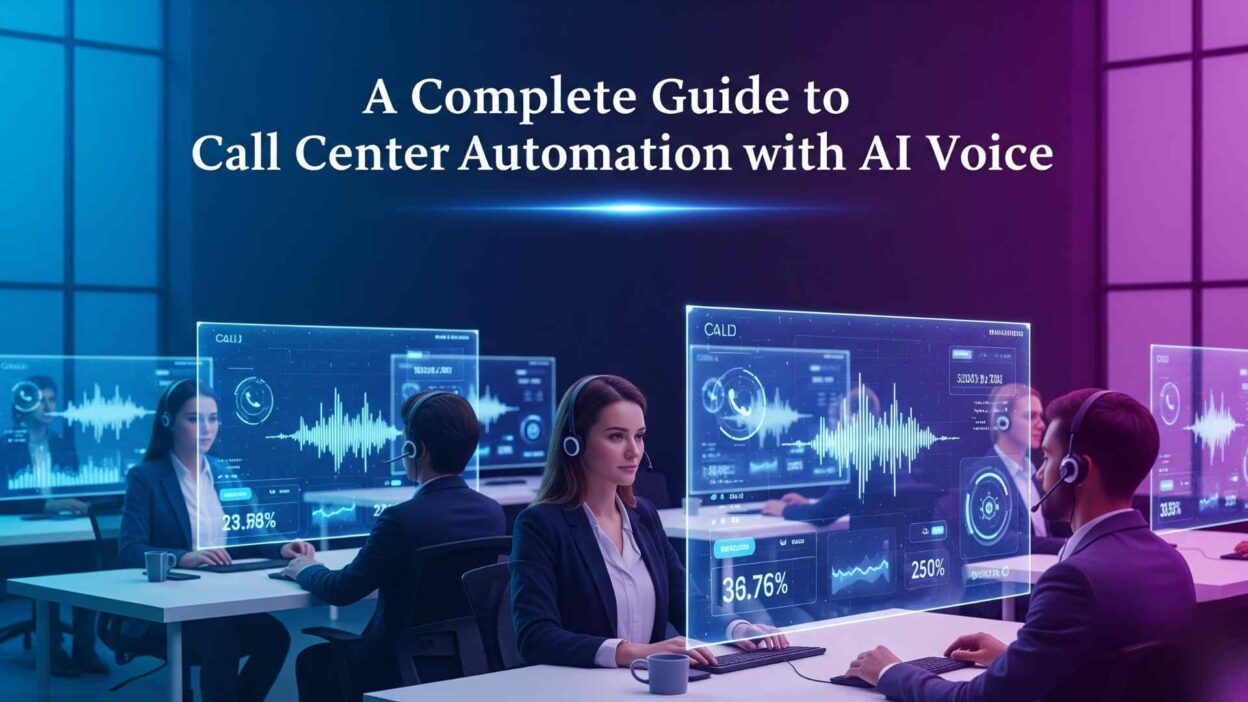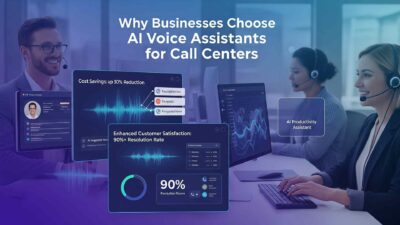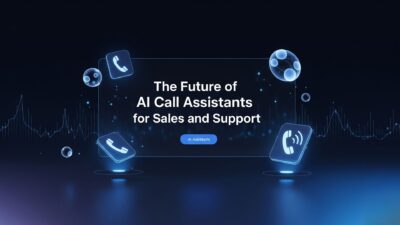TL;DR AI voice call center automation is revolutionizing how businesses handle customer communications and support operations in 2025. Modern companies are implementing intelligent voice technology to streamline call center processes and improve customer satisfaction rates. This comprehensive guide explores everything you need to know about transforming your call center with AI voice automation.
Table of Contents
Understanding AI Voice Call Center Automation Fundamentals
AI voice call center automation uses artificial intelligence to handle incoming and outgoing customer calls without human agent intervention. Advanced voice recognition technology processes customer speech and provides appropriate responses through natural conversations. The system handles routine inquiries while escalating complex issues to human representatives seamlessly.
Traditional call centers rely entirely on human agents to manage customer communications. This approach creates capacity limitations during peak periods and increases operational costs significantly. Agent availability restricts customer service hours and creates inconsistent service quality based on individual agent performance.
Core Components of Voice Automation Systems
Voice automation platforms consist of several integrated technologies working together to deliver effective customer communication. Speech recognition engines convert customer voice input into digital text for processing. Natural language understanding systems analyze customer intent and determine appropriate response strategies.
Conversation management platforms orchestrate interactions between customers and automated systems. These platforms maintain conversation context and ensure smooth transitions between topics or escalation to human agents. Database integrations provide real-time access to customer information and business data.
PreCallAI’s voice bot technology incorporates all these components into a unified platform designed for call center automation excellence. Our system delivers human-like conversations while maintaining the efficiency and scalability advantages of AI voice call center automation.
Benefits of AI Voice Call Center Automation for Modern Businesses
Implementing voice automation technology provides measurable improvements in customer service operations and business performance. Cost reductions of 60-80% occur when routine calls are handled through AI voice call center automation systems. Customer satisfaction improves through faster response times and consistent service quality.
Operational Cost Reduction Through Voice Technology
Human call center agents require salaries, benefits, training, and physical workspace infrastructure. These costs multiply with business growth and peak period staffing requirements. AI voice call center automation eliminates most of these ongoing expenses while providing superior availability and consistency.
Automated voice systems handle multiple conversations simultaneously without additional cost increases. Peak period scaling happens instantly without hiring delays or training requirements. PreCallAI’s pricing model scales with usage rather than fixed staffing costs.
Enhanced Customer Experience and Satisfaction
Customers receive immediate assistance through AI voice call center automation without waiting in phone queues. Voice technology provides personalized responses based on customer history and preferences. The system maintains conversation context throughout interactions for coherent and helpful communication.
24/7 availability ensures customers receive support regardless of time zones or business hours. Emergencies receive immediate attention through automated triage and escalation procedures. Customer effort decreases significantly when voice automation resolves issues quickly and accurately.
Industry-Specific Applications of Voice Automation
Different industries implement AI voice call center automation based on their unique customer service requirements and operational challenges. Each sector discovers specific advantages that align with their business objectives and customer expectations.
Healthcare Call Center Voice Automation
Medical organizations use AI voice call center automation for appointment scheduling, prescription refill requests, and basic health information inquiries. Voice technology provides patient education and medication reminders through compassionate and accurate communication. Healthcare accessibility improves for elderly patients and those with mobility challenges.
Insurance companies leverage voice automation to handle claims reporting, policy inquiries, and benefit explanations through natural conversations. Complex insurance terminology becomes understandable through voice assistants trained on healthcare communication patterns. Customer anxiety decreases when they receive clear explanations and immediate assistance.
Financial Services Voice Technology Implementation
Banks implement AI voice call center automation for account balance inquiries, transaction history requests, and fraud alert management. Voice assistants provide secure authentication and personalized financial guidance. Customers receive immediate assistance for routine banking needs without human agent involvement.
Investment firms use voice technology to deliver market updates, portfolio performance reports, and trading assistance through conversational interfaces. Complex financial concepts become accessible through voice explanations tailored to individual customer knowledge levels. PreCallAI ensures these sensitive conversations maintain security and accuracy standards consistently.
E-commerce Customer Service Automation
Online retailers deploy AI voice call center automation to manage order tracking, return processing, and product recommendation requests efficiently. Voice technology understands purchase history and provides personalized shopping assistance. Customer service inquiries receive immediate responses regardless of call volume fluctuations.
Subscription services use voice automation to handle billing inquiries, service modifications, and cancellation requests through empathetic conversations. Customer retention improves when voice assistants address concerns proactively and offer appropriate solutions or alternatives.
Technical Requirements for Successful Implementation
AI voice call center automation requires robust technical infrastructure supporting real-time voice processing and business system integration. Cloud-based platforms ensure scalable performance during peak call periods. Security protocols protect customer voice data and personal information consistently.
Voice Recognition and Processing Technology
High-accuracy speech recognition systems form the foundation of effective AI voice call center automation implementations. Voice engines must understand diverse accents, speaking speeds, and background noise conditions accurately. Natural language processing capabilities interpret customer intent from conversational speech patterns.
Real-time processing requirements demand powerful computing resources and optimized algorithms. Latency must remain below 200 milliseconds to maintain natural conversation flow. PreCallAI’s voice technology achieves industry-leading performance standards while maintaining cost-effective operation models.
Integration with Existing Business Systems
Voice automation platforms must connect seamlessly with CRM systems, databases, and customer service tools currently used by businesses. API integrations enable real-time data access during customer conversations. Automated actions like appointment scheduling or order updates occur through voice command processing.
Workflow integration ensures AI voice call center automation enhances rather than disrupts existing customer service procedures. Human agent escalation processes maintain conversation context and customer information seamlessly. Quality assurance systems monitor voice interactions to ensure service standard compliance.
Implementation Strategy and Best Practices
Successful AI voice call center automation deployment requires systematic planning and phased rollout approaches. Pilot programs test effectiveness with specific customer segments and use cases. Gradual expansion ensures system stability and customer adoption success.
Planning Your Voice Automation Deployment
Requirements analysis identifies optimal use cases for AI voice call center automation within existing customer service operations. Call volume analysis reveals patterns and peak periods that benefit most from automation. Customer inquiry categorization helps prioritize automation opportunities.
Technology selection involves evaluating voice platforms based on accuracy, integration capabilities, and scalability requirements. PreCallAI provides consultation services to help businesses identify optimal voice automation solutions. Our team ensures implementations align with specific business objectives and customer communication preferences.
Training and Customization Processes
Voice automation systems require extensive training with business-specific terminology, policies, and procedures before customer deployment. Industry knowledge bases provide accurate information for customer inquiries. Conversation flow design ensures natural interactions that align with brand personality.
Staff training prepares human agents for collaboration with AI voice call center automation systems. Escalation procedures and handoff protocols ensure seamless transitions between automated and human assistance. Quality monitoring processes maintain service standards across all interaction types.
Overcoming Common Voice Automation Challenges
Businesses implementing AI voice call center automation face several technical and operational challenges during deployment and operation phases. Voice recognition accuracy, customer acceptance, and system integration complexity require careful attention and planning.
Voice Recognition Accuracy and Environmental Factors
Background noise, poor phone connections, and diverse accents can impact voice recognition accuracy during customer calls. AI voice call center automation systems must function reliably across various communication conditions. Advanced noise cancellation and accent adaptation technologies address these challenges effectively.
Testing voice recognition performance with representative customer populations ensures accurate functionality before full deployment. PreCallAI conducts extensive testing to verify voice technology performance across diverse customer demographics and communication scenarios.
Customer Adoption and Acceptance Strategies
Some customers prefer human interaction for sensitive issues or complex problem-solving scenarios. Building customer confidence in AI voice call center automation requires demonstrating value through consistently helpful interactions. Clear communication about voice assistant capabilities sets appropriate customer expectations.
Opt-out options provide customer choice while encouraging voice automation trial usage. Positive experiences with simple tasks build customer comfort with more complex voice assistant capabilities over time.
Measuring Success and ROI from Voice Automation
Comprehensive measurement frameworks track both technical performance and business impact metrics from automated call handling implementations. Resolution rates, customer satisfaction scores, and cost savings demonstrate implementation effectiveness and return on investment.
Key Performance Indicators for Voice Call Centers
Call resolution rates measure how effectively voice automation addresses customer inquiries without human agent involvement. First-call resolution percentages indicate voice assistant problem-solving capabilities. Customer satisfaction surveys provide feedback about voice interaction quality and helpfulness.
Cost-per-call metrics demonstrate financial benefits compared to traditional human agent costs. Automated call handling typically reduces per-interaction costs by 70-90% while improving service availability and consistency. Volume handling capabilities show scalability advantages during peak periods.
Long-term Business Impact Assessment
Customer retention rates indicate whether voice automation enhances or detracts from overall customer relationships. Net promoter scores measure customer willingness to recommend businesses based on voice service experiences. These metrics guide continuous improvement efforts and expansion decisions.
Revenue impact analysis examines how automated call handling affects sales conversion rates and customer lifetime value. Improved service accessibility often leads to increased customer engagement and business growth. PreCallAI helps businesses track these comprehensive performance indicators accurately.
Future Developments in Call Center Voice Technology
Automated call handling technology continues evolving rapidly with new capabilities emerging regularly. Machine learning advances improve conversation quality and problem-solving abilities continuously. Integration with emerging technologies expands voice automation applications significantly.
Advanced AI Capabilities and Features
Next-generation voice assistants will demonstrate enhanced emotional intelligence and conversation management skills. Predictive analytics will enable proactive customer service through automated outreach based on usage patterns and potential issues. These capabilities transform reactive customer service into relationship-building opportunities.
Multi-modal interfaces will combine voice interaction with visual elements and text communication seamlessly. Customers will switch between communication methods based on their preferences and situational requirements. AI voice call center solutions will accommodate diverse customer communication styles automatically.
Industry-Specific Voice Solution Evolution
Specialized voice assistants will emerge with deep domain knowledge for specific industries and use cases. Healthcare voice technology will understand medical terminology and patient privacy requirements. Financial services platforms will incorporate regulatory compliance and security features automatically.
Vertical-specific AI voice call center solutions solutions will provide more accurate and helpful customer interactions. Industry expertise embedded in voice technology creates competitive advantages for businesses in specialized markets. PreCallAI develops industry-focused voice solutions that address unique sector requirements effectively.
Read More: What Are Voice SEO Benefits for Local Business Visibility?
Getting Started with AI Voice Call Center Automation

Businesses ready to implement voice automation should begin with comprehensive needs assessment and clear objective setting. Successful deployments require understanding current customer service challenges and identifying optimal automation opportunities. PreCallAI offers implementation consulting and ongoing support services.
Pilot program design enables testing voice automation effectiveness with controlled customer groups and specific use cases. Small-scale deployments provide learning opportunities while minimizing implementation risks. Success metrics from pilot programs guide expansion decisions and optimization strategies.
The transformation to AI voice call center solutions represents a strategic investment in customer service excellence and operational efficiency. Businesses that embrace this technology now will establish lasting competitive advantages in customer communication and satisfaction. Contact PreCallAI today to begin your voice automation journey and discover how intelligent voice technology can revolutionize your customer service operations.






[…] Read More: A Complete Guide to Call Center Automation with AI Voice […]